Journal of Southern Medical University ›› 2025, Vol. 45 ›› Issue (3): 622-631.doi: 10.12122/j.issn.1673-4254.2025.03.20
Previous Articles Next Articles
Qingqing HUANG1( ), Wenjing ZHANG1, Xiaofeng ZHANG1,4, Lian WANG2,4, Xue SONG3,4, Zhijun GENG3,4, Lugen ZUO2,4, Yueyue WANG1,4, Jing LI1,4, Jianguo HU1,4(
), Wenjing ZHANG1, Xiaofeng ZHANG1,4, Lian WANG2,4, Xue SONG3,4, Zhijun GENG3,4, Lugen ZUO2,4, Yueyue WANG1,4, Jing LI1,4, Jianguo HU1,4( )
)
Received:2024-10-08
Online:2025-03-20
Published:2025-03-28
Contact:
Jianguo HU
E-mail:hqq10100@163.com;jghu9200@bbmc.edu.cn
Qingqing HUANG, Wenjing ZHANG, Xiaofeng ZHANG, Lian WANG, Xue SONG, Zhijun GENG, Lugen ZUO, Yueyue WANG, Jing LI, Jianguo HU. High MYO1B expression promotes proliferation, migration and invasion of gastric cancer cells and is associated with poor patient prognosis[J]. Journal of Southern Medical University, 2025, 45(3): 622-631.
Add to citation manager EndNote|Ris|BibTeX
URL: https://www.j-smu.com/EN/10.12122/j.issn.1673-4254.2025.03.20
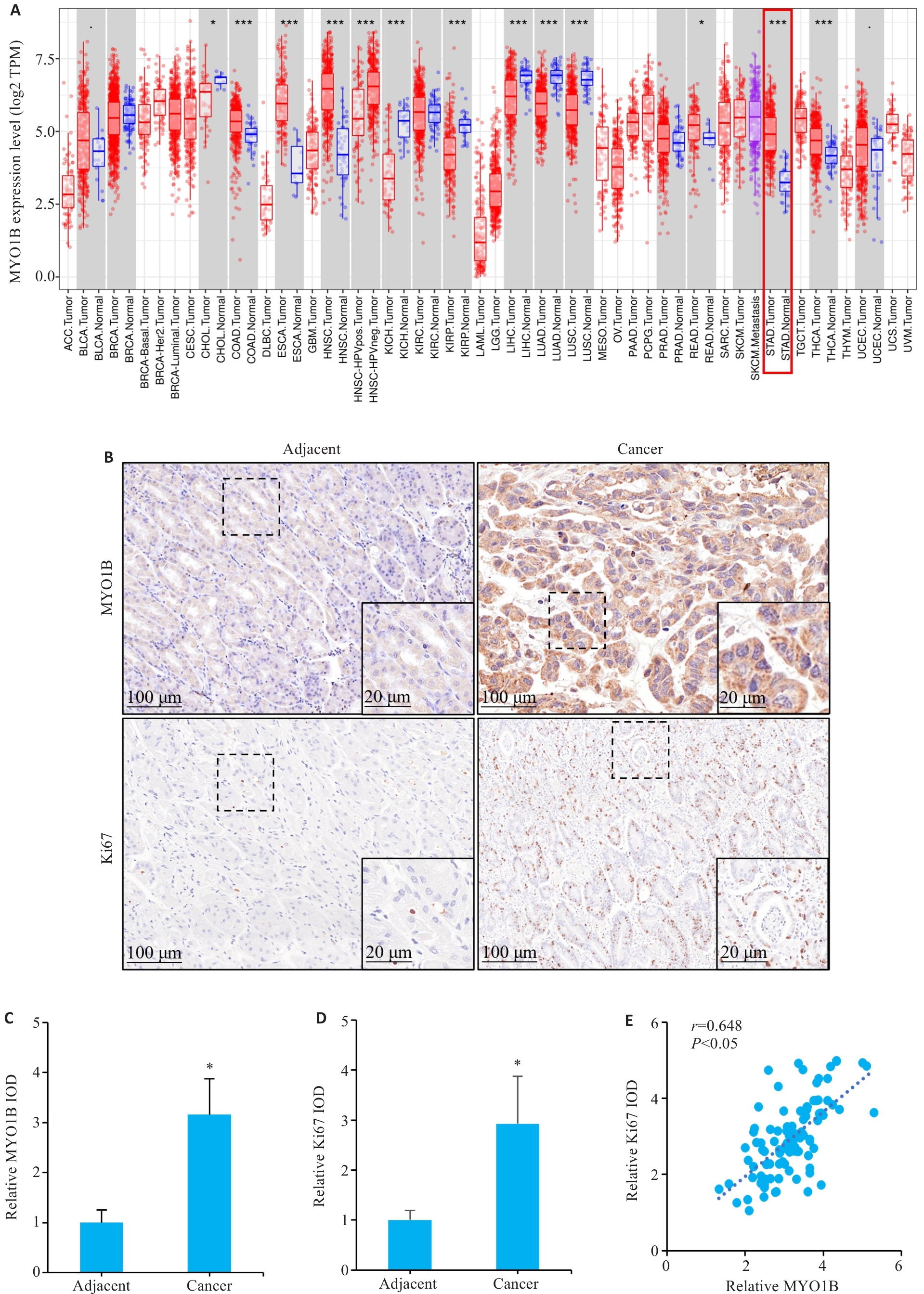
Fig.1 MYO1B is highly expressed in gastric cancer tissues and is associated with tumor proliferation activity. A: Pan-cancer differential analysis from the TIMER database. B: Immunohistochemical staining (Markers: MYO1B and Ki67). C: Relative IOD value of MYO1B. D: Relative IOD value of Ki67. E: Pearson correlation analysis. *P<0.05 vs adjacent tissue.

Fig.2 High MYO1B expression is significantly correlated with tumor grading and staging in gastric cancer patients. A: Correlation between MYO1B expression (transcript per million, TPM) and tumor grading in gastric cancer. B: Correlation between MYO1B TPM and tumor staging in gastric cancer. **P<0.01, ***P<0.001 vs Normal.
| Characteristic | n | MYO1B | χ2 | P | |
|---|---|---|---|---|---|
| Low expression (n=52) | High expression (n=53) | ||||
| Gender | 0.232 | 0.630 | |||
| Female | 69 | 33 | 36 | ||
| Male | 36 | 19 | 17 | ||
| Age (year) | 1.144 | 0.285 | |||
| <60 | 49 | 27 | 22 | ||
| ≥60 | 56 | 25 | 31 | ||
| Pathohistological type | 0.077 | 0.782 | |||
| Adenocarcinoma | 74 | 36 | 38 | ||
| Other | 31 | 16 | 15 | ||
| CEA (μg/L) | 9.258 | 0.002 | |||
| <5 | 45 | 30 | 15 | ||
| ≥5 | 60 | 22 | 38 | ||
| CA19-9 (kU/L) | 11.675 | <0.001 | |||
| <37 | 49 | 33 | 16 | ||
| ≥37 | 56 | 19 | 37 | ||
| Tumor size (cm) | 1.153 | 0.283 | |||
| <5 | 43 | 24 | 19 | ||
| ≥5 | 62 | 28 | 34 | ||
| Histological grading | 16.005 | <0.001 | |||
| G1-G2 | 52 | 36 | 16 | ||
| G3-G4 | 53 | 16 | 37 | ||
| T Stage | 9.160 | 0.002 | |||
| T1-T2 | 53 | 34 | 19 | ||
| T3-T4 | 52 | 18 | 34 | ||
| N Stage | 9.155 | 0.002 | |||
| N0-N1 | 49 | 32 | 17 | ||
| N2-N3 | 56 | 20 | 36 | ||
Tab.1 Relationship between MYO1B expression level and parameters of cancer progression in gastric cancer patients
| Characteristic | n | MYO1B | χ2 | P | |
|---|---|---|---|---|---|
| Low expression (n=52) | High expression (n=53) | ||||
| Gender | 0.232 | 0.630 | |||
| Female | 69 | 33 | 36 | ||
| Male | 36 | 19 | 17 | ||
| Age (year) | 1.144 | 0.285 | |||
| <60 | 49 | 27 | 22 | ||
| ≥60 | 56 | 25 | 31 | ||
| Pathohistological type | 0.077 | 0.782 | |||
| Adenocarcinoma | 74 | 36 | 38 | ||
| Other | 31 | 16 | 15 | ||
| CEA (μg/L) | 9.258 | 0.002 | |||
| <5 | 45 | 30 | 15 | ||
| ≥5 | 60 | 22 | 38 | ||
| CA19-9 (kU/L) | 11.675 | <0.001 | |||
| <37 | 49 | 33 | 16 | ||
| ≥37 | 56 | 19 | 37 | ||
| Tumor size (cm) | 1.153 | 0.283 | |||
| <5 | 43 | 24 | 19 | ||
| ≥5 | 62 | 28 | 34 | ||
| Histological grading | 16.005 | <0.001 | |||
| G1-G2 | 52 | 36 | 16 | ||
| G3-G4 | 53 | 16 | 37 | ||
| T Stage | 9.160 | 0.002 | |||
| T1-T2 | 53 | 34 | 19 | ||
| T3-T4 | 52 | 18 | 34 | ||
| N Stage | 9.155 | 0.002 | |||
| N0-N1 | 49 | 32 | 17 | ||
| N2-N3 | 56 | 20 | 36 | ||
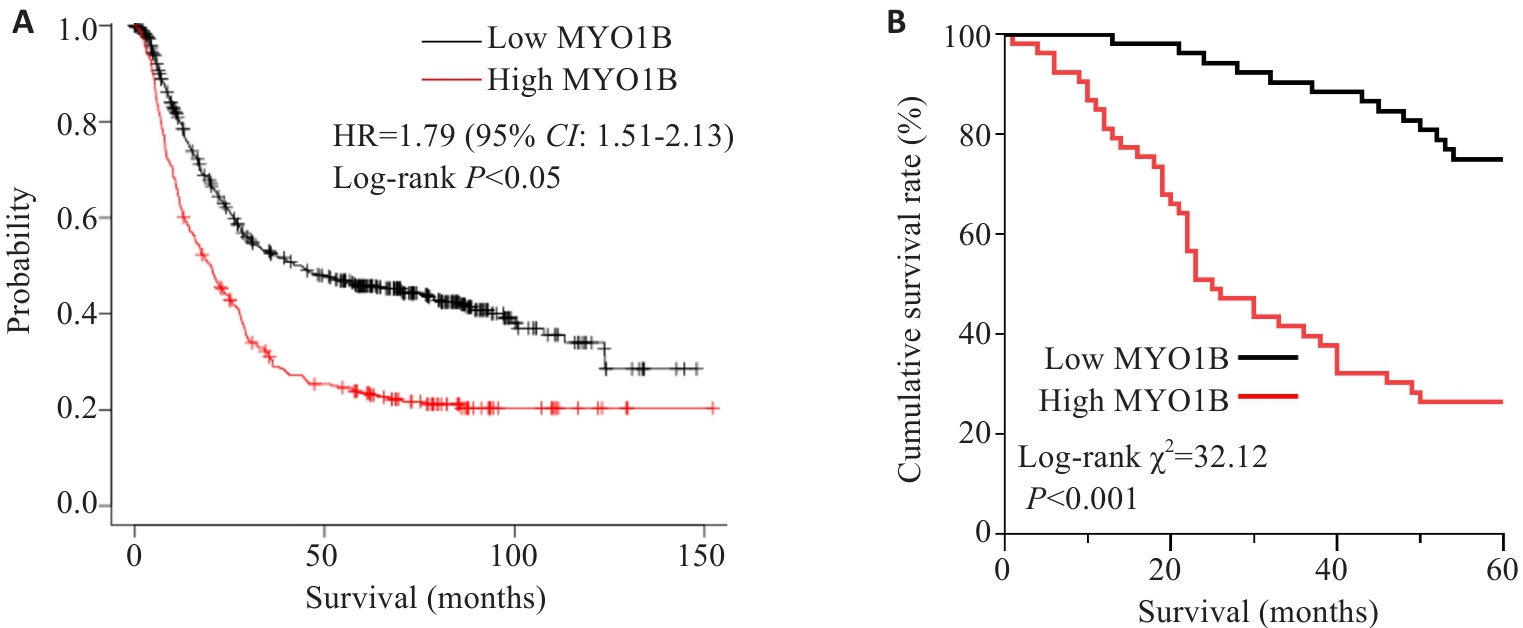
Fig.3 Impact of high MYO1B expression on 5-year postoperative survival of gastric cancer patients and its prognostic value. A: Analysis from the Kaplan-Meier Plotter database. B: Kaplan-Meier analysis.
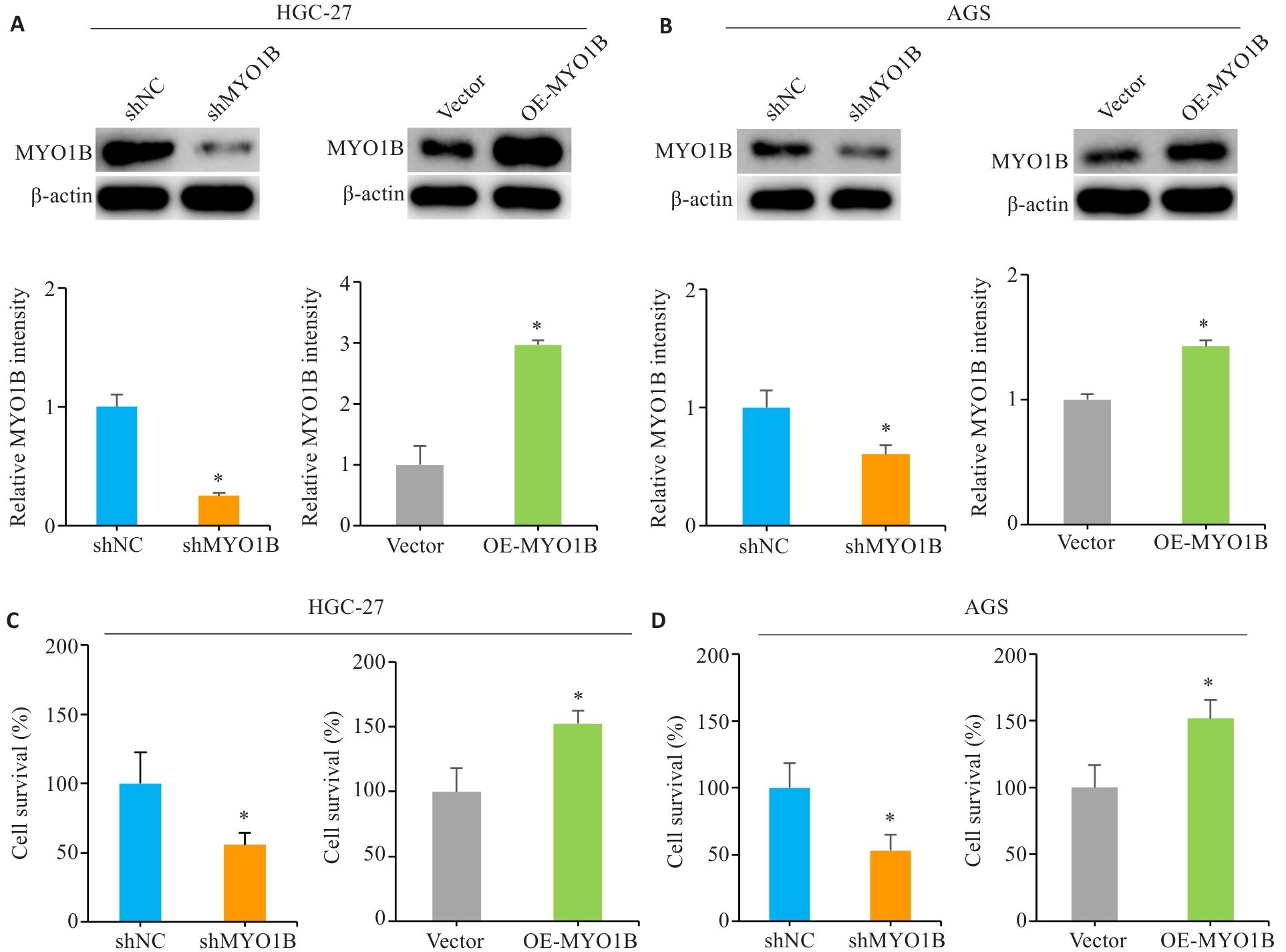
Fig.7 High expression of MYO1B promotes proliferation of gastric cancer cells. A, B: Verification of MYO1B knockdown and overexpression in HGC-27 and AGS cells. C, D: High expression of MYO1B promotes proliferation of HGC-27 and AGS cells. n=3, *P<0.05 vs shNC or Vector.
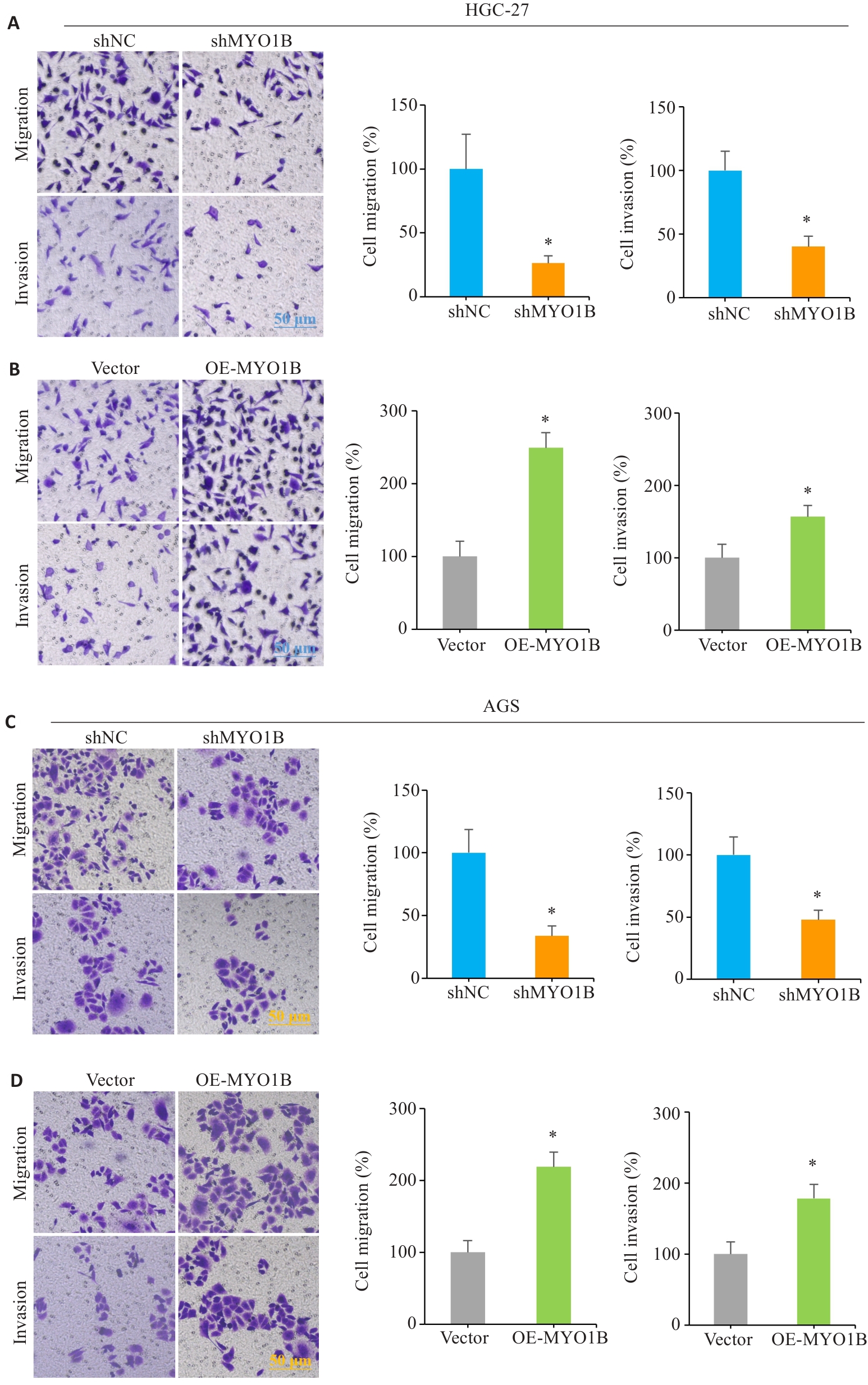
Fig.8 Overexpression of MYO1B promotes migration and invasion of gastric cancer cells. A, B: Overexpression of MYO1B promotes HGC-27 cell migration and invasion. C, D: Overexpression of MYO1B promotes AGS cell migration and invasion. n=3, *P<0.05 vs shNC or Vector.
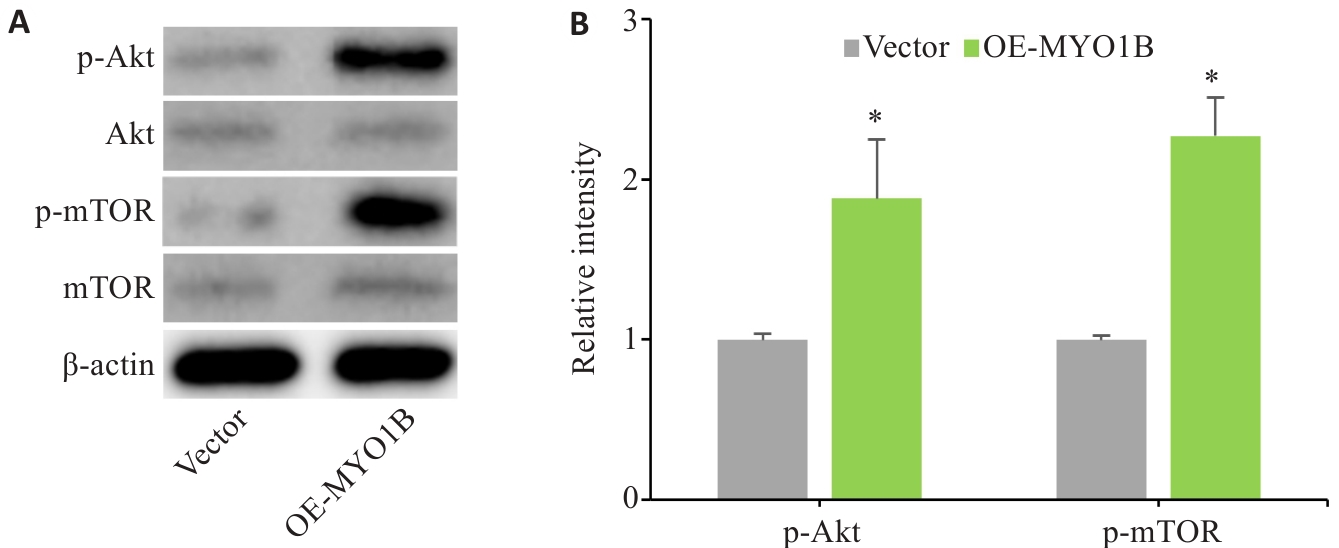
Fig.9 Overexpression of MYO1B may activate the Akt/mTOR pathway. A, B: MYO1B overexpression significantly enhances phosphorylation of Akt and mTOR in HGC-27 cells. n=3, *P<0.05 vs Vector.
| 1 | Xu WC, Li BL, Xu MC, et al. Traditional Chinese medicine for precancerous lesions of gastric cancer: a review[J]. Biomed Pharmacother, 2022, 146: 112542. |
| 2 | Bray F, Laversanne M, Sung H, et al. Global cancer statistics 2022: GLOBOCAN estimates of incidence and mortality worldwide for 36 cancers in 185 countries[J]. CA Cancer J Clin, 2024, 74(3): 229-63. |
| 3 | Turajlic S, Swanton C. Metastasis as an evolutionary process[J]. Science, 2016, 352(6282): 169-75. |
| 4 | 张文静, 张 诺, 杨 子, 等. BZW1高表达促进胃癌细胞的侵袭和转移: 基于调控Wnt//β-catenin通路和促进上皮间质转化[J]. 南方医科大学学报, 2024, 44(2): 354-62. |
| 5 | Song ZY, Wu YY, Yang JB, et al. Progress in the treatment of advanced gastric cancer[J]. Tumour Biol, 2017, 39(7): 1010428317714626. |
| 6 | Digklia A, Wagner AD. Advanced gastric cancer: Current treatment landscape and future perspectives[J]. World J Gastroenterol, 2016, 22(8): 2403-14. |
| 7 | Association JGC. Japanese gastric cancer treatment guidelines 2021 (6th edition)[J]. Gastric Cancer, 2023, 26(1): 1-25. |
| 8 | Pasechnikov V, Chukov S, Fedorov E, et al. Gastric cancer: prevention, screening and early diagnosis[J]. World J Gastroenterol, 2014, 20(38): 13842-62. |
| 9 | Chen XB, Huang YS, Wang YB, et al. THBS4 predicts poor outcomes and promotes proliferation and metastasis in gastric cancer[J]. J Physiol Biochem, 2019, 75(1): 117-23. |
| 10 | Stafford WF, Walker ML, Trinick JA, et al. Mammalian class I myosin, Myo1b, is monomeric and cross-links actin filaments as determined by hydrodynamic studies and electron microscopy[J]. Biophys J, 2005, 88(1): 384-91. |
| 11 | Li SH, Qian LM, Chen YH, et al. Targeting MYO1B impairs tumorigenesis via inhibiting the SNAI2/cyclin D1 signaling in esophageal squamous cell carcinoma[J]. J Cell Physiol, 2022, 237(9): 3671-86. |
| 12 | Chen YH, Xu NZ, Hong C, et al. Myo1b promotes tumor progression and angiogenesis by inhibiting autophagic degradation of HIF-1α in colorectal cancer[J]. Cell Death Dis, 2022, 13(11): 939. |
| 13 | Zhang HR, Lai SY, Huang LJ, et al. Myosin 1b promotes cell proliferation, migration, and invasion in cervical cancer[J]. Gynecol Oncol, 2018, 149(1): 188-97. |
| 14 | Chia NY, Tan P. Molecular classification of gastric cancer[J]. Ann Oncol, 2016, 27(5): 763-9. |
| 15 | López MJ, Carbajal J, Alfaro AL, et al. Characteristics of gastric cancer around the world[J]. Crit Rev Oncol Hematol, 2023, 181: 103841. |
| 16 | Karimi P, Islami F, Anandasabapathy S, et al. Gastric cancer: descriptive epidemiology, risk factors, screening, and prevention[J]. Cancer Epidemiol Biomarkers Prev, 2014, 23(5): 700-13. |
| 17 | Wang FH, Zhang XT, Li YF, et al. The Chinese society of clinical oncology (CSCO): clinical guidelines for the diagnosis and treatment of gastric cancer, 2021[J]. Cancer Commun, 2021, 41(8): 747-95. |
| 18 | Cheung KL, Graves CR, Robertson JF. Tumour marker measurements in the diagnosis and monitoring of breast cancer[J]. Cancer Treat Rev, 2000, 26(2): 91-102. |
| 19 | Haglund C. Tumour marker antigen CA125 in pancreatic cancer: a comparison with CA19-9 and CEA[J]. Br J Cancer, 1986, 54(6): 897-901. |
| 20 | Guo X, Peng YH, Song QY, et al. A liquid biopsy signature for the early detection of gastric cancer in patients[J]. Gastroenterology, 2023, 165(2): 402-13.e13. |
| 21 | Coluccio LM. Myosins and disease[J]. Adv Exp Med Biol, 2020, 1239: 245-316. |
| 22 | Wang ZS, Ying MZ, Wu Q, et al. Overexpression of myosin VI regulates gastric cancer cell progression[J]. Gene, 2016, 593(1): 100-9. |
| 23 | Xie L, Huang HY, Zheng Z, et al. MYO1B enhances colorectal cancer metastasis by promoting the F-actin rearrangement and focal adhesion assembly via RhoA/ROCK/FAK signaling[J]. Ann Transl Med, 2021, 9(20): 1543. |
| 24 | Yu Y, Xiong YY, Montani JP, et al. Arginase-II activates mTORC1 through myosin-1b in vascular cell senescence and apoptosis[J]. Cell Death Dis, 2018, 9(3): 313. |
| 25 | Wen LJ, Hu XL, Li CY, et al. Myosin 1b promotes migration, invasion and glycolysis in cervical cancer via ERK/HIF-1α pathway[J]. Am J Transl Res, 2021, 13(11): 12536-48. |
| 26 | Sun Z, Guo XP, Chen HR, et al. MYO1B as a prognostic biomarker and a therapeutic target in Arecoline-associated oral carcinoma[J]. Mol Carcinog, 2023, 62(7): 920-39. |
| 27 | Seferbekova Z, Lomakin A, Yates LR, et al. Spatial biology of cancer evolution[J]. Nat Rev Genet, 2023, 24(5): 295-313. |
| 28 | Zhang C, Tian W, Meng L, et al. PRL-3 promotes gastric cancer migration and invasion through a NF-κB-HIF-1α-miR-210 axis[J]. J Mol Med, 2016, 94(4): 401-15. |
| 29 | Zhang X, Wang S, Wang HX, et al. Circular RNA circNRIP1 acts as a microRNA-149-5p sponge to promote gastric cancer progression via the AKT1/mTOR pathway[J]. Mol Cancer, 2019, 18(1): 20. |
| 30 | Wang C, Yang Z, Xu E, et al. Apolipoprotein C-II induces EMT to promote gastric cancer peritoneal metastasis via PI3K/AKT/mTOR pathway[J]. Clin Transl Med, 2021, 11(8): e522. |
| 31 | Ma ZF, Chen H, Xia ZJ, et al. Energy stress-induced circZFR enhances oxidative phosphorylation in lung adenocarcinoma via regulating alternative splicing[J]. J Exp Clin Cancer Res, 2023, 42(1): 169. |
| [1] | Xinyuan CHEN, Chengting WU, Ruidi LI, Xueqin PAN, Yaodan ZHANG, Junyu TAO, Caizhi LIN. Shuangshu Decoction inhibits growth of gastric cancer cell xenografts by promoting cell ferroptosis via the P53/SLC7A11/GPX4 axis [J]. Journal of Southern Medical University, 2025, 45(7): 1363-1371. |
| [2] | Ting XIE, Yunyun WANG, Ting GUO, Chunhua YUAN. The peptide toxin components and nucleotide metabolites in Macrothele raveni venom synergistically inhibit cancer cell proliferation by activating the pro-apoptotic pathways [J]. Journal of Southern Medical University, 2025, 45(7): 1460-1470. |
| [3] | Jinlong PANG, Xinli ZHAO, Zhen ZHANG, Haojie WANG, Xingqi ZHOU, Yumei YANG, Shanshan LI, Xiaoqiang CHANG, Feng LI, Xian LI. Overexpression of multimerin-2 promotes cutaneous melanoma cell invasion and migration and is associated with poor prognosis [J]. Journal of Southern Medical University, 2025, 45(7): 1479-1489. |
| [4] | Xuan WU, Jiamin FANG, Weiwei HAN, Lin CHEN, Jing SUN, Qili JIN. High PRELID1 expression promotes epithelial-mesenchymal transition in gastric cancer cells and is associated with poor prognosis [J]. Journal of Southern Medical University, 2025, 45(7): 1535-1542. |
| [5] | Kang WANG, Haibin LI, Jing YU, Yuan MENG, Hongli ZHANG. High expression of ELFN1 is a prognostic biomarker and promotes proliferation and metastasis of colorectal cancer cells [J]. Journal of Southern Medical University, 2025, 45(7): 1543-1553. |
| [6] | Xinrui HOU, Zhendong ZHANG, Mingyuan CAO, Yuxin DU, Xiaoping WANG. Salidroside inhibits proliferation of gastric cancer cells by regulating the miR-1343-3p-OGDHL/PDHB glucose metabolic axis [J]. Journal of Southern Medical University, 2025, 45(6): 1226-1239. |
| [7] | Yumei ZENG, Jike LI, Zhongxi HUANG, Yibo ZHOU. Villin-like protein VILL suppresses proliferation of nasopharyngeal carcinoma cells by interacting with LMO7 protein [J]. Journal of Southern Medical University, 2025, 45(5): 954-961. |
| [8] | Yaqing YUE, Zhaoxia MU, Xibo WANG, Yan LIU. Aurora-A overexpression promotes cervical cancer cell invasion and metastasis by activating the NF-κBp65/ARPC4 signaling axis [J]. Journal of Southern Medical University, 2025, 45(4): 837-843. |
| [9] | Yi ZHANG, Yu SHEN, Zhiqiang WAN, Song TAO, Yakui LIU, Shuanhu WANG. High expression of CDKN3 promotes migration and invasion of gastric cancer cells by regulating the p53/NF-κB signaling pathway and inhibiting cell apoptosis [J]. Journal of Southern Medical University, 2025, 45(4): 853-861. |
| [10] | Shunjie QING, Zhiyong SHEN. High expression of hexokinase 2 promotes proliferation, migration and invasion of colorectal cancer cells by activating the JAK/STAT pathway and regulating tumor immune microenvironment [J]. Journal of Southern Medical University, 2025, 45(3): 542-553. |
| [11] | Huali LI, Ting SONG, Jiawen LIU, Yongbao LI, Zhaojing JIANG, Wen DOU, Linghong ZHOU. Prognosis-guided optimization of intensity-modulated radiation therapy plans for lung cancer [J]. Journal of Southern Medical University, 2025, 45(3): 643-649. |
| [12] | Xue SONG, Yue CHEN, Min ZHANG, Nuo ZHANG, Lugen ZUO, Jing LI, Zhijun GENG, Xiaofeng ZHANG, Yueyue WANG, Lian WANG, Jianguo HU. GPSM2 is highly expressed in gastric cancer to affect patient prognosis by promoting tumor cell proliferation [J]. Journal of Southern Medical University, 2025, 45(2): 229-238. |
| [13] | Jinhua ZOU, Hui WANG, Dongyan ZHANG. SLC1A5 overexpression accelerates progression of hepatocellular carcinoma by promoting M2 polarization of macrophages [J]. Journal of Southern Medical University, 2025, 45(2): 269-284. |
| [14] | Yu BIN, Ziwen LI, Suwei ZUO, Sinuo SUN, Min LI, Jiayin SONG, Xu LIN, Gang XUE, Jingfang WU. High expression of apolipoprotein C1 promotes proliferation and inhibits apoptosis of papillary thyroid carcinoma cells by activating the JAK2/STAT3 signaling pathway [J]. Journal of Southern Medical University, 2025, 45(2): 359-370. |
| [15] | Zhoufang CAO, Yuan WANG, Mengna WANG, Yue SUN, Feifei LIU. LINC00837/miR-671-5p/SERPINE2 functional axis promotes pathological processes of fibroblast-like synovial cells in rheumatoid arthritis [J]. Journal of Southern Medical University, 2025, 45(2): 371-378. |
| Viewed | ||||||
|
Full text |
|
|||||
|
Abstract |
|
|||||